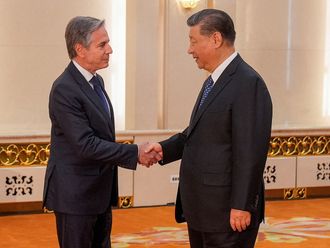Seoul: In the wake of Kim Jong-un’s summit with US President Donald Trump, anti-American souvenirs once sold on the North Korean side of the Demilitarised Zone have disappeared from gift shop shelves, western tour operators say.
Among more generic gifts like ginseng, a North Korean shop on the tourist route to the fortified border between the two Koreas usually sold stamps, postcards and other souvenirs attacking the United States.
“They’re always very popular, not very subtle, and, as of now, have all been removed,” said Simon Cockerell, general manager at Koryo Tours.
Staff were unlikely to remove the items unless instructed, he said, and the removal follows Kim’s declaration of an end to testing of nuclear weapons and ballistic missiles while focusing on developing North Korea’s economy.
It’s the latest sign of a change in tone by Pyongyang, where tour operators said in May anti-American posters had mostly given way to less political messages.
Kim met Trump in Singapore on June 12, amid a flurry of diplomatic activity by the reclusive North Korean leader.
They signed a statement that was light on details, but agreed to work to establish “new” ties with each other. The two nations’ enmity dates from the 1950-1953 Korean War that killed hundreds of thousands and devastated the Korean peninsula.
As one of the most visible legacies of the war, the DMZ has become a tourist attraction in both North and South Korea.
“We had a group go down to the DMZ from Pyongyang three days after the summit held in Singapore where we noticed the change in what was being sold to tourists at the gift shop,” said Rowan Beard, a tour manager at Young Pioneer Tours.
“They’ve shifted the focus from anti-Americanism to improving agriculture, sports and boosting the local economy.”
North Korean propaganda posters are perhaps best known for their anti-American messages, but they have also featured themes such as agriculture and science, which are now getting more exposure.
“It’s not just at the DMZ, all the anti-American posters I usually see around Kim Il-sung Square and at shops [in Pyongyang], they’ve all just gone,” Beard said.
“In five years working in North Korea, I’ve never seen them completely disappear before.”
But Cockerell cautioned that only time would tell how long the changes might last.
“At the present time anti-Americanism is not the number one thing on the cultural docket,” Cockerell said.
“The anti-American things have been replaced by more positive and aspirational things.”












